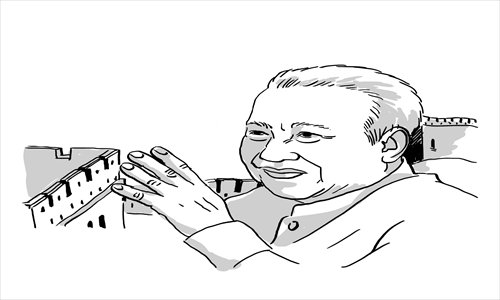Sihanouk shaped Sino-Cambodian ties

For the majority of Cambodians, the death of former king Norodom Sihanouk on October 15 was the loss of a great national father who dedicated his life for the sake of his country and his people. They revere his long dedication to his country and his legacy as a unifying national leader.
It is hoped that his legacy will allow Cambodia to advance the national healing process.
In early stages, Sihanouk's political life was developed through Southeast Asia's turbulent postwar history. In the 1940s, four of Cambodia's Northern provinces were invaded and occupied by armed forces from Thailand. Then in 1954, even after Cambodia had gained full independence from France, the Viet Minh forces infiltrated the country while its military situation remained unsettled.
Cambodia's past history of foreign subjugation and its very uncertain prospects for survival prompted the king to look for much stronger and more trustworthy allies. Cambodia's quest for security and nation-building assistance impelled the prince to search in Asia, and beyond, to accept help from all donors as long as there was no impingement upon his country's sovereignty.
China has had a historic, cultural and commercial relationship with Cambodia. China has also played a prominent role in Cambodia's foreign relations since the country attained full independence in late 1953.
Cambodia engaged China in two distinctive areas: peace and national reconciliation; and economic development.
Cambodia's relations with China have been based on mutual interests. Sihanouk hoped that China would restrain the Vietnamese and the Thai from acting to Cambodia's detriment. China acceptance of Sihanouk's overtures has been a valuable counterweight to growing Vietnamese and Thai pressure on Cambodia.
Sihanouk was able to cultivate a profound, friendly relationship with different generations of Chinese leaders. In mid-1958, the diplomatic relations between the two countries were established. This friendly relationship laid a solid foundation for the long-standing cooperation between the two nations.
Sihanouk's experience with the French, as the leader of the "royal crusade for independence," led him to conclude that the US, like France, would eventually be leaving Southeast Asia.
From this perspective, the Western presence in Indochina was only a temporary interruption of the real dynamics of the region, continued by Vietnamese, and perhaps even Thai, expansion at Cambodia's expense. Friendly ties with China during the late 1950s and the 1960s were tactics designed to counteract these dynamics.
Cambodia does have some geopolitical significance to China. China's close ties with Cambodia have also served to provide leverage against Vietnamese influence in the region. China viewed Cambodia's nonalignment as vital in preventing the encirclement of the region by other powerful countries and their allies.
Cambodia is at the heart of Southeast Asia. The centralization of China in Cambodia is meaningful to the whole region.
Cambodia is pivotal to China strategies to project greater influence in Southeast Asia, a region which is home to roughly 500 million inhabitants and is an economically relevant trade partner to the US, the EU and Japan. The region accrues a gross national product of more than $700 billion and sits atop some of the most transited sea route.
Cambodia also has an important role in maintaining the overall situation of friendly relations between China and ASEAN. Cambodia and China have closely built up bilateral ties and cooperation and friendship.
At the recent ASEAN regional Summit in Phnom Penh, despite criticism by some political observers, Cambodia rightly opted to alleviate the tension by placing the South China Sea issue off the agenda. It is a proven fact that Cambodia and China have a long and close relationship with each other in both historical and contemporary cooperation.
The author is executive director of the Cambodian Institute of Human Rights. opinion@globaltimes.com.cn